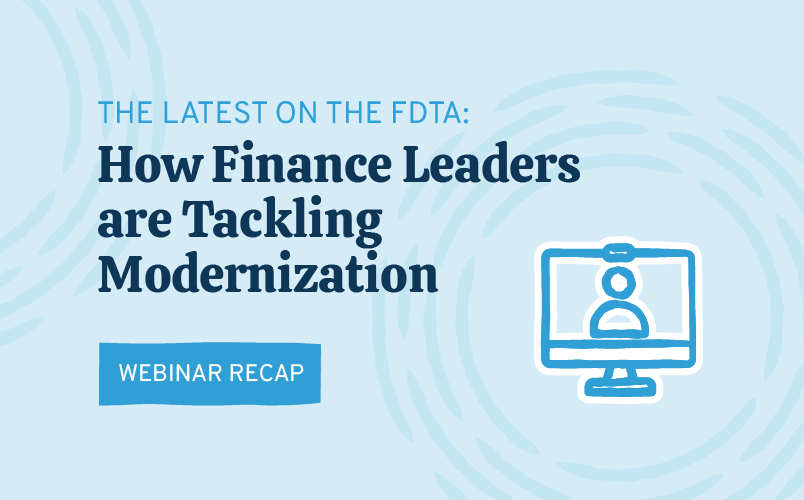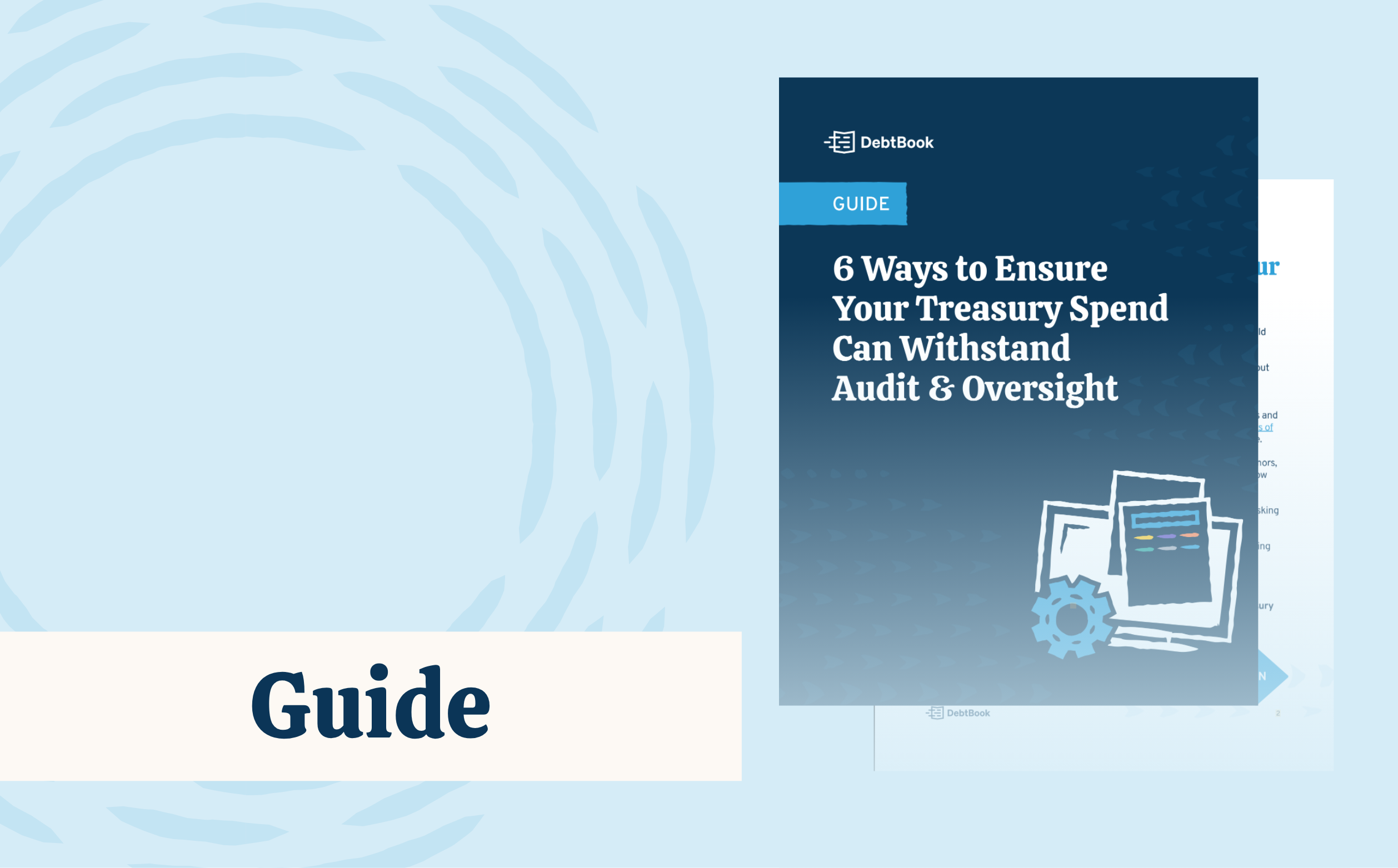On April 4, 2024, DebtBook and Funkhouser & Associates hosted the "Latest on the FDTA: How Finance Leaders are Tackling Modernization" webinar which served as a crucial forum for demystifying the complexities of the Financial Data Transparency Act (FDTA). The webinar, moderated by Mark Funkhouser, introduced a panel of industry leaders discussing the Act's potential to reshape municipal finance. Their conversation wasn’t just about compliance with new regulations but also about leveraging the upcoming FDTA as a tool for enhanced fiscal management—one that promises benefits for our communities.
At the heart of this webinar was a simple question: How can finance leaders not only prepare for the impending changes but also capitalize on them for the greater good?
Panelists:
- Mark Funkhouser, President of Funkhouser & Associates
- Ahmed Abonamah, CFO of Cleveland, Ohio
- Megan Kilgore, Auditor of Columbus, Ohio
- Tyler Traudt, CEO & Co-Founder of DebtBook
Watch the FDTA Webinar Recording
The Federal Data Transparency Act
The FDTA represents a landmark initiative to revolutionize financial reporting within local governments. At its core, the FDTA aims to enhance the transparency of financial data by mandating the adoption of machine-readable and structured data formats by 2027. Orchestrated under the watchful eye of the Securities and Exchange Commission (SEC), this transition is more than an update to reporting standards; it's a commitment to the future of fiscal responsibility.
The legislation propels a significant leap from static, cumbersome documents to dynamic, interactive reports that invite scrutiny and enable analysis. By facilitating easier access to financial data, the FDTA seeks to empower stakeholders—be it residents, investors, or policymakers—with a clearer understanding of where and how public funds are allocated and utilized. This shift is not solely for satisfying regulatory compliance but also for encouraging a culture of openness, driving better governance, and strengthening the bond between municipalities and their residents.
Ahmed Abonamah’s Insights: The FDTA's Role in Advancing Municipal Transparency and Public Trust
Ahmed Abonamah took the webinar attendees through a journey of the municipal market's evolution, focusing on the significance of federal disclosure practices. His insights, stemming from over six years at the SEC, depicted a market in the midst of transformation, with the FDTA standing as a natural progression in a series of efforts aimed at enhancing transparency. Abonamah articulated how the FDTA's push for machine-readable formats is not just about meeting new standards but aligning with a broader goal: modernizing municipal operations to foster a higher level of engagement with citizens.
The FDTA, according to Abonamah, is poised to elevate public trust to higher levels. By facilitating easier access to financial information, local governments can forge a stronger, more transparent relationship with the people. Abonamah's vision is one where the act becomes an integral part of a municipality's commitment to transparency, where every citizen has the opportunity to understand and engage with the financial workings of their government.
“Manual labor happens every day in the finance department whether comparing ourselves to peers or looking at macro and regional economic data for more robust financial planning,” said Abonamah. “It’s all in spreadsheets and documents provided to us from various departments in the city. If the agencies get this right, the FDTA will make some of that work easier. There will be a lot of challenges to make that easier, but it’s there and having this in place will let us build more public trust, by being more transparent and offering information to our residents.”
Megan Kilgore’s Experience: Early Adoption of the FDTA Principles
Megan Kilgore provided a compelling case study with Columbus's early implementation of FDTA principles. Her account detailed the transformative effects of adopting machine-readable financial reporting well ahead of the 2027 deadline. Kilgore shared how this shift has not just been about upgrading systems, but about revolutionizing the very essence of fiscal communication and management.
For Kilgore, the power of machine-readable data transcends the practical. “Modernization for us gives us a platform to replicate with respect to our natural progression in machine-readable financials. I have to acknowledge that my motivation for having these conversations is to demystify what machine-readable financial reporting is. Most people haven’t even seen it. Once you see the power of it, it’s —AH HA!— now I understand the power it can provide me as a government leader and transform the way we do business.”
By embracing machine-readable formats, Columbus has set the stage for financial statements that speak to the needs of the city and its citizens, ensuring that the communication of financial data is as proficient as its management.
“What gets me excited about the FDTA,” continued Kilgore, “is that by bringing all of this data to life we’re going to create a lot more information that is readily accessible to folks like ourselves, and to those working on the outside bringing services to the government.”
Tyler Traudt’s Observations: Overcoming Recruitment Challenges with FDTA Innovations
Tyler Traudt brought a valuable external perspective to the panel, spotlighting the recruitment and retention challenges that finance teams face. Traudt shared the critical need for modernization in a sector where the pending retirement of a knowledgeable workforce threatens to leave a significant knowledge gap. He described the finance teams' struggle to attract new talent in a competitive industry where institutional knowledge is most important.
However, Traudt sees the FDTA not as a hurdle but as an opportunity to bridge this gap through automation and the implementation of sophisticated tools.
“The productivity is leaving. We need to find more of it,” said Traudt. “We can bring in people to do that but if we’re struggling to bring people in, that means that we need to find ways to make people more efficient in their roles.”
He believes that modernized, machine-readable systems instituted by the FDTA could encapsulate and transmit institutional knowledge, mitigating the impact of workforce turnover. In his view, the FDTA could serve as a catalyst, bringing governmental finance into an era where efficiency and knowledge management are bolstered by technology.
“We’re going to have to rely on automation and technology more,” added Mark Funkhouser. “At the same time, particularly for young people, getting them interested in government and accounting and finance is dependent on us having technology and tools. These are people used to looking at everything on their phones very easily and they get frustrated and unhappy with systems that are antiquated, bulky, and slow. If we embrace technology we can keep more of those younger folks in accounting and auditing.”
Panelists' One Minute Takeaways
The session concluded with each panelist offering a one-minute takeaway—a condensed call to action or insight drawn from the webinar’s rich discussion.
Ahmed Abonamah spoke on the importance of engagement in the regulatory process. He emphasized the power that finance professionals have to shape the outcome of FDTA rule-making through active participation, suggesting that their practical, on-the-ground insights are invaluable for developing workable regulations.
“I encourage you all to individually, or collectively, engage in the comment process in a constructive way,” he said. “Really focus on the real practical issues and help us understand what they are. If you recommend practical ways to deal with them, you will help shape the contours of any rule making that comes out.”
Megan Kilgore urged leaders to take the lead with FDTA implementation. “Try to put yourself into the driver’s seat so the FDTA is not happening to you, but rather as a way that you can better manage your local governments and reframe it as ‘what can I do with this to make it so I can focus instead on ‘xyz’ in my day.’”
Mark Funkhouser stressed the necessity of embracing technology as a means of attracting and retaining the next generation of government finance professionals. He pointed out that the tools and systems that come with the FDTA are essential for keeping younger, tech-savvy professionals engaged and invested in the sector.
An essential element in preparing for the FDTA involves staying as informed as possible. Tyler Traudt spoke on the significance of the FDTA Playbook, "How Local Governments Can Prepare for the FDTA," which will be updated biannually to reflect new developments and insights related to the FDTA. DebtBook and Funkhouser & Associates will also be offering ongoing webinars to ensure organizations confidently navigate the transition, leveraging the FDTA's introduction to foster greater transparency and accountability.
Related Public Finance Reading
- Playbook: How Local Governments Can Prepare for the FDTA
- How DebtBook Simplifies Lease Payment Reconciliation
- GASB 87 Ongoing Compliance
Disclaimer: DebtBook does not provide professional services or advice. DebtBook has prepared these materials for general informational and educational purposes, which means we have not tailored the information to your specific circumstances. Please consult your professional advisors before taking action based on any information in these materials. Any use of this information is solely at your own risk.






